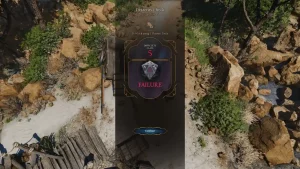Ability Checks are a critical gameplay mechanic in Baldur’s Gate 3 that determines whether your character succeeds or fails at various actions and tasks. When attempting an action, the game will prompt you to make an Ability Check by rolling a 20-sided die (d20) and adding your character’s relevant ability modifier. You succeed if the total meets or exceeds the Difficulty Class (DC) set by the game.
How to Boost BG3 Ability Checks

Understanding how to make effective Ability Checks is key to overcoming challenges and progressing through Baldur’s Gate 3. Each character has six core abilities Strength, Dexterity, Constitution, Intelligence, Wisdom, and Charisma. These abilities have a numerical score that provides a modifier you add to d20 rolls for relevant checks. For example, if you have 14 Strengths, your Strength modifier is +2, so you would add +2 to any Strength-based assessment.
You can boost your odds of success in several ways.
- Focus on your character’s strengths by choosing skills tied to their highest abilities. A high Strength or Dexterity character should lean on Athletics or Acrobatics checks.
- Pay attention to advantages and disadvantages, which let you roll 2d20 and take the higher or lower result. Advantages can come from equipment, spells, environmental factors and more.
- Don’t forget passive checks for perception and investigation – these are fixed bonuses that may automatically detect secrets.
Differences Between Ability Checks and Saving Throws

When playing BG3, you’ll often be asked to make an ability check or a saving throw. It’s important to know the difference.
- Saving Throws are reactionary and happen when your character needs to resist an effect. For Saving Throws, you roll a d20 and add your ability modifier for that Saving Throw (Strength, Dexterity, etc.) along with your proficiency bonus if you’re proficient in that Saving Throw.
- Ability Checks are voluntary actions your character takes, like climbing a wall or sneaking past guards. You just roll a d20 and add the relevant ability modifier for an average Ability Check. For an Ability Check, like Athletics or Stealth, you also add your proficiency bonus if you’re proficient in that skill.
Choosing when to make Ability Checks, and weighing the risks and rewards of success or failure, is important in Baldur’s Gate 3. Save often so you can reload and retry failed checks if necessary.
That’s all we have Ability Checks in Baldur’s Gate (BG3). If you found this guide useful, head to our Baldur’s Gate 3 dedicated section.

